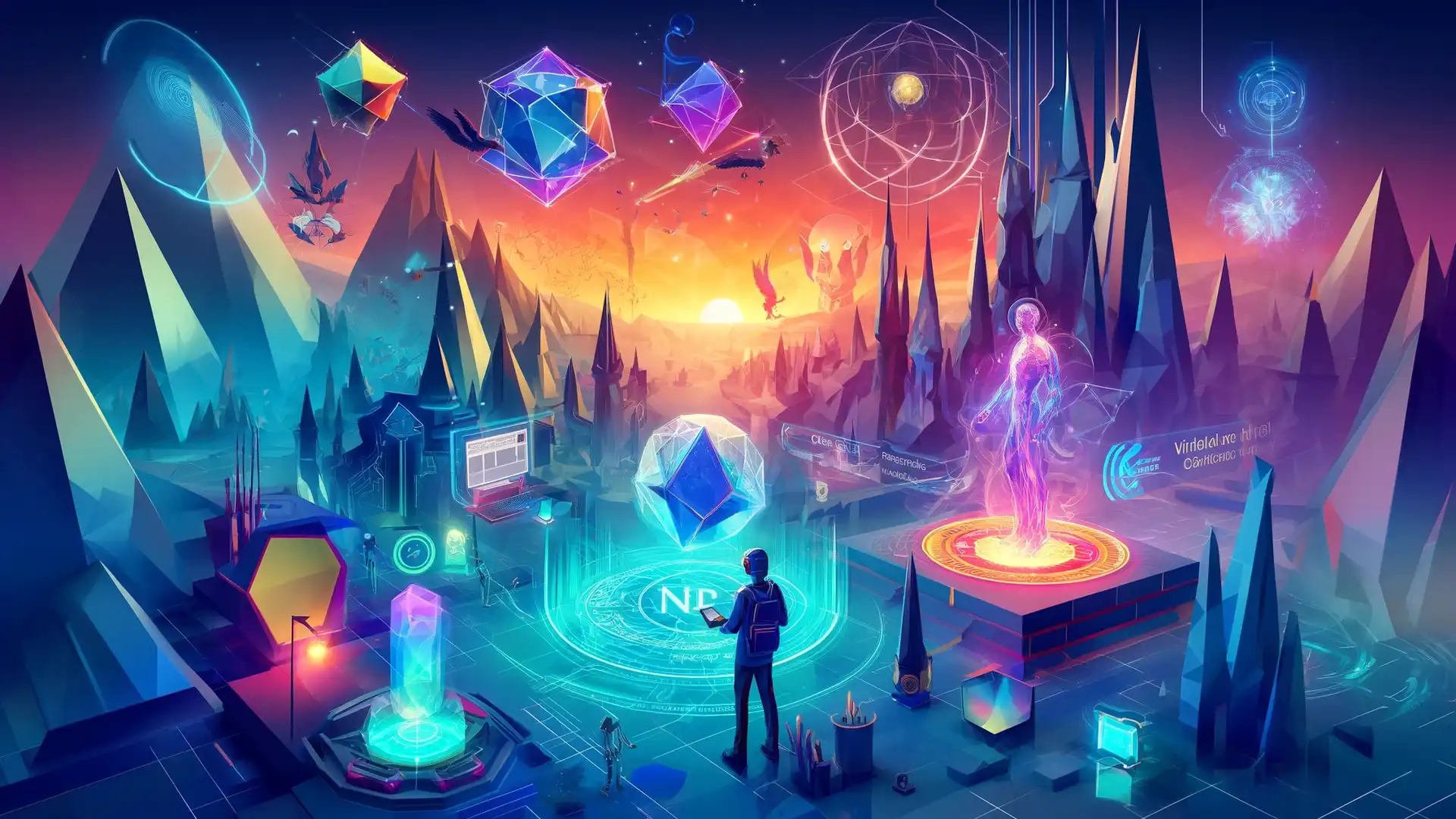The Benefits of NFT-Based Credentials

 Author:
Artem Grigoriev
Author:
Artem Grigoriev
Securing Identity and Ownership: The Technological Shift in Credentials
As we navigate the digital age, our methods for managing, sharing, and verifying credentials are swiftly evolving . This transformation is driven by the groundbreaking integration of Non-Fungible Tokens (NFTs) and blockchain technology . In this chapter, we delve into the growing importance of NFT-based credentials, which offer myriad benefits that enhance security, boost transparency, and provide immutable verification—all crucial for significantly reducing fraud and enhancing the integrity of credentials.
📘 This article complements: "The Complete Guide to NFT Credentials". Explore it to find answers to all your questions;)
Blockchain technology , the backbone of NFTs, serves as a resilient digital ledger that is distributed across numerous computers, making altering or forging information nearly impossible. A recent IBM study suggests that blockchain could reduce credential fraud by more than 30% in industries heavily reliant on certifications, pointing to a significant shift towards more secure and reliable methods for managing personal and professional data.
NFTs represent a significant advancement over traditional systems, whether paper-based or simple digital forms, which are vulnerable to tampering and loss. Leveraging the decentralized nature of blockchain technology, NFTs ensure that each credential is unique, traceable, and safeguarded against duplication or falsification. This results in a robust method for managing credentials that fundamentally transforms their issuance, storage, and verification. Experts at Stanford University's Blockchain Research Center highlight that this digital shift not only enhances security but also greatly increases the efficiency of managing and accessing credentials, swiftly adapting to the rapid changes in global workforce demands.
The practical implications of this shift are profound, especially in fields like education and professional development:
-
In education , NFTs can symbolize degrees and certificates, enabling instant verification by employers or educational institutions worldwide. This streamlines the recruitment and admissions processes, eliminating the need for candidates to physically present their credentials or undergo lengthy verification procedures. The Massachusetts Institute of Technology (MIT) has initiated a pilot project issuing digital diplomas as NFTs, allowing for instant verification and reducing administrative burdens. This demonstrates the practical benefits and potential scalability of this technology in educational settings.
-
For professional development , NFTs offer a dynamic platform where individuals can continuously update their credentials with new skills and qualifications in real time. This provides a more comprehensive and up-to-date view of a professional's capabilities and simplifies the process for employers to assess potential candidates' qualifications accurately. LinkedIn has reported an increase in profiles featuring NFT-based credentials, reflecting a growing acceptance and utilization in professional networking and job searches, underscoring the rising importance of NFTs in modern career management .
💡 Note: NFTs and blockchain provide a dynamic system for managing professional development, allowing individuals to update and verify their qualifications in real time.

However, the adoption of NFT-based credentials faces challenges. The digital divide represents a significant barrier, as not all potential users have equal access to the necessary technology to effectively utilize these digital credentials. Additionally, widespread digital literacy is essential to ensure that everyone can benefit from this advanced technology. The World Economic Forum has emphasized the importance of addressing this digital divide, particularly in developing countries, to ensure equitable access to the advantages of blockchain technology. These insights underscore the need for inclusive policies and programs that expand access and provide education about blockchain and digital credentials.
Regulatory considerations are also crucial in the adoption of NFT-based credentials. Establishing clear legal frameworks is essential for effectively managing the ownership, privacy, and transfer of digital credentials, vital for protecting users' rights and building trust in these new systems. Regulatory bodies like the European Union are actively discussing guidelines that could shape the future of digital credential management, vital for creating a secure and transparent ecosystem for these new technologies.
The global impact of NFT-based credentials is highly promising, offering a universally recognized and easily verifiable record of skills and education. This greatly enhances mobility for job seekers and students internationally, expanding individual opportunities and enriching the global talent pool. It enables companies and educational institutions to access a more diverse set of candidates. The United Nations supports initiatives that use blockchain to promote global educational and employment mobility, highlighting the international value and potential of NFT-based systems in enhancing global workforce dynamics.
Looking forward, the chapter discusses potential future developments in the realm of NFT credentials, including their integration with artificial intelligence (AI). This convergence could lead to more sophisticated, automated systems that not only store credentials but also help predict job suitability and academic potential based on detailed credential data. Research by Gartner predicts that by 2025, AI-enhanced blockchain technologies will be key in customizing education and workforce management, presenting exciting opportunities at the intersection of technology and human capital management .
This exploration into NFT-based credentials highlights significant advancements and challenges in integrating this technology into modern credentialing practices. By providing a detailed examination of their current applications and future potential, this chapter offers a comprehensive view of how NFTs are reshaping the landscape of identity and ownership in the digital age, marking a new era of security and transparency.
💡 Tip: When considering NFT-based credentials, understanding both the technological foundations and the potential need for new regulations is crucial to fully leverage their benefits.

Implementing and Advancing NFT Credentials: Challenges and Future Prospects
In this chapter, we delve into the intricate world of NFT-based credentials, exploring both the practical aspects of their implementation and the forward-looking possibilities they offer. We examine the cost-effectiveness and environmental impact of these digital credentials, alongside the challenges they pose and the transformative opportunities they create for lifelong learning and global career development. The World Economic Forum suggests that NFTs could simplify global education and workforce management , potentially reducing the costs associated with credential verification by up to 90%. This positions them as a highly promising tool for reducing global disparities in access to education and employment.
Cost-effectiveness is a significant advantage of NFT-based credentials compared to traditional systems. These digital tokens can drastically cut administrative costs by reducing the need for physical materials and removing intermediaries in the credential verification process. Although the shift from physical to digital formats promises substantial long-term savings, it may come with high initial setup costs. However, these economic benefits are tempered by concerns over the energy consumption of blockchain networks, prompting the exploration of more sustainable alternatives like proof of stake protocols. These protocols aim to minimize environmental impact by utilizing a proof of stake method—a consensus mechanism that is more energy-efficient and environmentally friendly than traditional proof of work systems. Initiatives like Ethereum's transition to a proof of stake model, known as Ethereum 2.0, exemplify efforts to reduce the ecological footprint of blockchain technologies and align with global sustainability goals.
The challenges of incorporating NFT technology into the credentialing process are considerable, especially in terms of data privacy and security . While blockchain provides a highly secure platform, its immutable nature poses challenges in complying with privacy regulations such as the GDPR's right to erasure. Innovations like zero-knowledge proofs offer potential solutions that balance security needs with privacy demands. This technology enables the verification of credentials without exposing underlying personal data, gradually refining the technology to meet strict global data protection regulations, thus increasing user trust and system reliability .
Technological integration with existing blockchain infrastructures is another significant challenge. Ensuring that different blockchain platforms can operate seamlessly together is crucial for the widespread acceptance and effectiveness of NFT credentials. This challenge calls for standardization and robust cryptographic practices to maintain secure and efficient operations and bridges the gap between newer blockchain applications and established systems. The International Organization for Standardization (ISO) is developing global standards for blockchain, which could significantly enhance the interoperability and security of NFT credentials, further solidifying their role in international credential management.
💡 Note: Interoperability and standardization are crucial for integrating NFT credentials with existing blockchain systems to ensure that credentials are universally recognizable and verifiable.

The transformative potential of NFTs in learning and development is particularly promising. They enable the creation of portable career portfolios , which comprehensively document an individual's educational and professional achievements in a format that is globally accessible and verifiable. This approach supports a dynamic model of lifelong learning where credentials are continually updated and accumulated, enhancing an individual’s appeal to prospective employers. This fluidity is vital in today’s rapidly evolving job market where ongoing learning and adaptability are key to maintaining career longevity. Such adaptability not only benefits individuals but also allows organizations to manage talent more effectively, having access to current and verifiable information.
Looking ahead, NFT credentials are poised to significantly enhance global access to educational and professional opportunities. They potentially standardize and democratize access to quality education and career paths, particularly in developing countries or regions with less formal educational infrastructure. This could lead to a more equitable distribution of educational and professional opportunities, leveling the playing field for people around the world. The United Nations Educational, Scientific and Cultural Organization (UNESCO) views these innovations as essential tools for achieving inclusive educational practices, contributing to a more inclusive global society.
This chapter provides a comprehensive overview of the current state and future prospects of NFT-based credentials. It equips readers with a deeper understanding of both the practicalities and transformative potential, opening new doors for how credentials are perceived and utilized globally. This paves the way for personal and professional growth.
💡 Tip: Embrace the potential of NFT credentials to promote lifelong learning and global career mobility. Stay informed about technological advancements and regulatory developments in this field.

Types of NFT Credentials: Which One to Choose and Why?
The Power of NFT Rewards: Boosting Engagement and Loyalty in Education
Step-by-Step Guide to Creating, Issuing, and Implementing NFT Credentials
What Is TTP (Trusted Third Party) and Why It's Essential for NFT Credential Verification
NFT and Blockchain in Education: How are they used and why?
